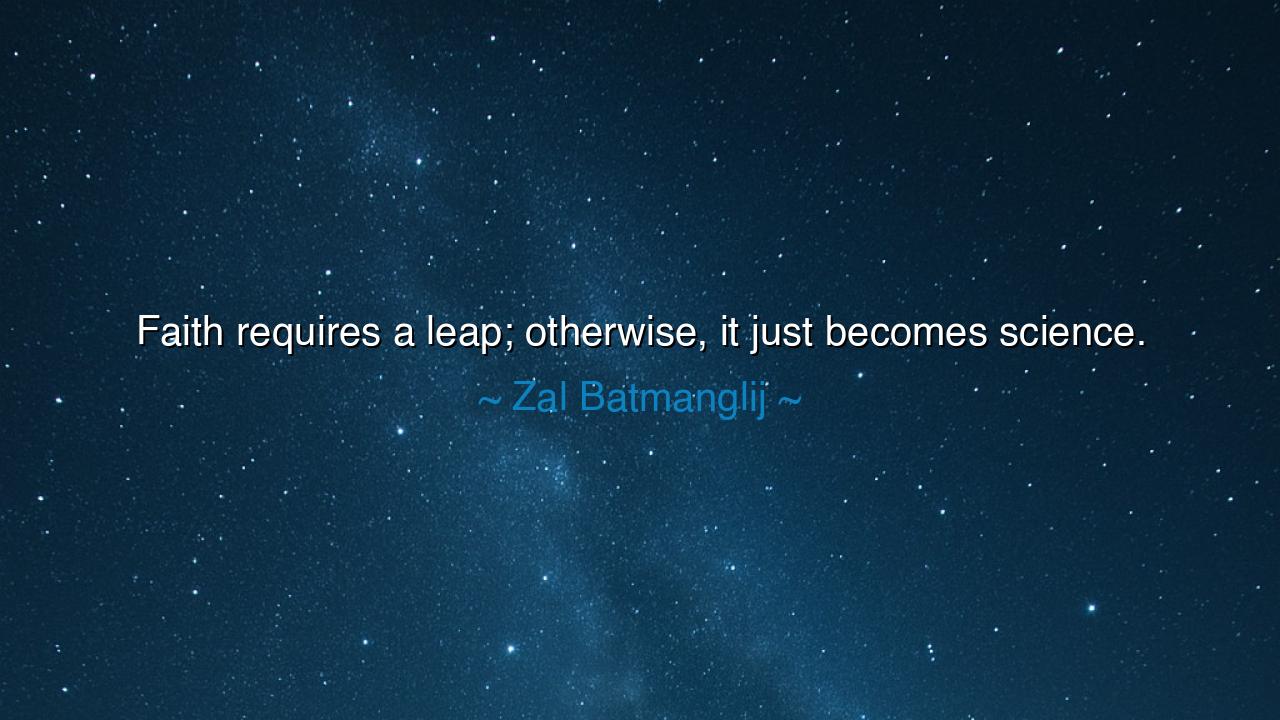
Faith requires a leap; otherwise, it just becomes science.






Hear now, O seekers of wisdom, the profound words of Zal Batmanglij: "Faith requires a leap; otherwise, it just becomes science." These words speak to the very essence of faith—a force that transcends logic, reason, and even evidence. Faith is the leap into the unknown, the belief in something that cannot be touched, seen, or proven, but is still held with the certainty of the heart. It is a choice, a commitment to trust in something greater than oneself, a willingness to embrace the unknown without the assurance of proof. Batmanglij's words call us to understand that without this leap, faith becomes nothing more than a structured, empirical system, grounded in observation and measurable outcomes, like the work of science.
In the ancient world, the philosophers understood the distinction between faith and knowledge. Plato, in his dialogues, often explored the tension between the known and the unknown, between what can be measured and what must be believed. Socrates, the great seeker of truth, taught that while knowledge and logic have their place, there are deeper truths that cannot be contained by mere reasoning. For faith, unlike science, does not demand the burden of proof. Faith exists in the unseen, in the mysteries that are beyond human understanding. Without the leap—without stepping into the unknown with belief and conviction—faith becomes a hollow shell, reduced to mere facts, no longer carrying the transformative power it once held.
Consider, O wise ones, the great figures of history whose lives embodied this leap of faith. Martin Luther King Jr., standing before a world steeped in injustice, did not rely solely on reason or evidence to call for change. His vision of a world where all people are treated equally was built on a faith in humanity, a belief in the moral arc of the universe that bends toward justice. His faith was not rooted in the observable world; it was a leap, a belief in something greater than the harsh realities of his time. It was this faith that inspired him to act, to push for change, even when the outcome was uncertain. And in his belief, he became the spark that ignited a revolution.
The leap of faith is, therefore, an essential component of any profound transformation, whether in the world or in the heart. Batmanglij’s words remind us that science—grounded in logic and evidence—can explain the how of the world, but it cannot explain the why. The questions that reside in the depths of the soul, the yearning for meaning, purpose, and connection, lie beyond the reach of reason alone. If we seek to understand the full complexity of human existence, we must be willing to leap into the unknown, to trust in something beyond what we can measure and prove.
Let us turn our gaze to the ancients once more, to Abraham, the father of three great faiths. When God called upon him to leave his homeland and journey into the unknown, Abraham did not wait for signs or certainty. He acted on his faith, stepping forward into the wilderness, trusting in a promise he could not see or prove. His faith was not in logic or reasoning, but in something far greater—the belief that his actions would fulfill a divine purpose. His leap brought him to places unknown, but it was his faith that defined his legacy, not his knowledge of what lay ahead.
This, O wise ones, is the lesson for us: faith requires a leap. It requires us to step beyond the confines of what is known, beyond the reach of our reason, and into the realm of the unseen. Without this leap, faith is nothing more than science—it becomes a system of rules, devoid of the transformative power that only belief can provide. Science explains the world as it is, but faith inspires us to reach for the stars, to dream of what could be, and to act with conviction even when we cannot see the end.
Let this wisdom guide you, O seekers, in your own lives. When faced with the unknown, when the path forward is obscured by doubt, remember that faith is not about certainty, but about trust. It is about believing in something greater than what the eyes can see, something that calls to the soul and moves the heart. Let the leap of faith be your guide, for it is in that leap that true transformation happens, in the heart and in the world. Science may tell us how to navigate the physical world, but it is faith that leads us to discover the deeper truths of our existence, guiding us toward a life of purpose, meaning, and transcendence.






AAdministratorAdministrator
Welcome, honored guests. Please leave a comment, we will respond soon